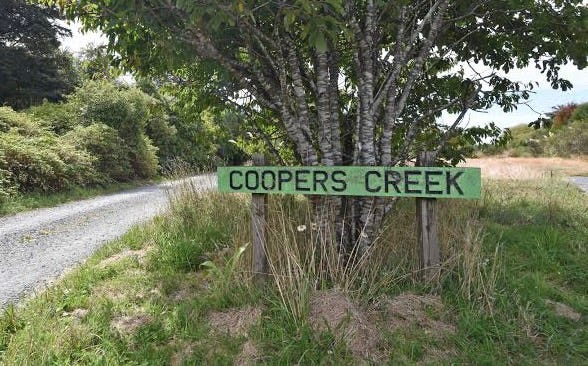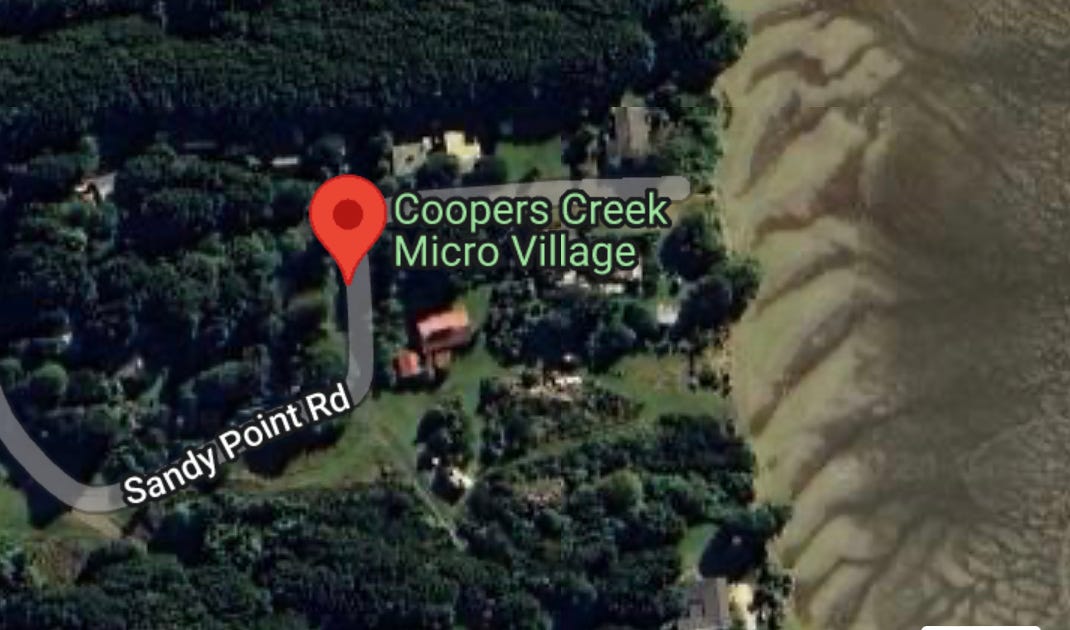The dispute: Tiny village's stoush with council rolls on
"We certainly need to get a resolution. It can’t go on."

The Southland Tribune is a reader-supported publication. To receive new posts and support my work, consider becoming a free or paid subscriber.
It’s a dispute that has decades of baggage. In fact, there’s centuries of history worth delving into to get the clearest of pictures.
The tiny village of Coopers Creek and the Invercargill City Council have been at odds for years.
Words as strong as betrayal have been bandied about. There’s been complaints to the Ombudsman and talk of legal challenges.
Invercargill Mayor Nobby Clark has had enough. He says it is time, once and for all, to resolve the matter.
“We certainly need to get a resolution. It can’t go on,” Clark says.
The 3.5-hectare Coopers Creek village is situated at Sandy Point and overlooks Whalers Bay. It’s 17km from central Invercargill.
The village is made up of 17 dwellings and has a population of about 26 people.
It’s mostly described as a micro-village, although resident Kerry Hapuku suggests retirement village is probably a better description.
Most of the residents are 65-plus and pensioners, she says.
Coopers Creek has no reticulated water supply, no power supply, no postal route, or rubbish collection.
Residents argue significant increases to their annual fee charges, by the council, is unfair given the lack of council services they tap into.
And they also say they are rated on freehold land when they instead have a lease to occupy agreement.
But the dispute is fuelled by more than annual fees.
When residents fronted the council on Tuesday, they staked their case for more certainty for the future of their own houses and the wider village.
A small Māori population lived at Sandy Point for several hundred years before the first Europeans reached New Zealand. It’s believed their main village, Oue, was situated where the Coopers Creek settlement is now.
The village, as it is now, stemmed from a move in 1949 to extend the roading network at Sandy Point.
It appears in the 1950s the council then made an effort to establish Coopers Creek through clearing and surveying work to allow for holiday or residential homes.
In 1974 the sites at Coopers Creek were extended from 16 to 24. The last house was built in 1992.

The residents own the houses they reside in but the land those houses sit on is owned by the Invercargill City Council.
Infact that land - as part of Sandy Point - is regarded reserve land. That’s where the problems, and effectively the dispute, comes into play.
Sandy Point was previously regarded a “domain” but the Minister in 1992 approved a plan to change Sandy Point’s status to reserve land.
As a result, Coopers Creek was determined as “non-conforming use”. The term non-conforming use appears to have been a “bone-of-contention” amongst the tension between Coopers Creek residents and the council.
A policy was introduced to gradually phase out the Coopers Creek cribs by “natural attrition”.
Residents believe there has been an ongoing erosion of their rights, as well as a reduced sense of security, as years have passed.
Hapuku and other Coopers Creek residents want to see the reserve land status revoked.
That they feel that would help provide a solution to move forward, given the council would not be restrained by the Reserves Act 1977.
“There have been dwellings in this area for a proximately 70 years, we want to be considered part of the community,” Hapuku says.
“Given the length of time that we and others have existed in the vicinity we believe we have existing use and historical rights.”
“The current management plan requires the current residents to be phased out. We have taken advice and come to the conclusion the best situation is to revoke the reserve status on the village area to allow the village to remain and become conforming.”
“Why would the council require the phasing out of a settlement that has existed in harmony with its surrounding area for over 100 years? It is no burden on council… Please ensure our community can remain for another 100 years,” Hapuku told councillors on Tuesday.
Hapuku says they simply want some security and equity in their Coopers Creek homes, and they want the support of the elected members to do that.
Mayor Clark isn’t sure it would be as easy as Hapuku may think to simply revoke reserve land status at Coopers Creek.
Clark says his reading of the Act suggests the revoking of reserve land is “a very serious issue and not done lightly”.
It would need got to the Minister and iwi would probably get involved, he says.
“This is just my personal view, [the people that apply] may well be flogging a bit of a dead horse. It’s extremely difficult.
“In today’s environment I can’t see the Minister being keen on carving off a piece of land to free hold it…. So, the issue then is what can we do in the current environment to make it much better than it is at the moment?”
Cooper Creek resident representatives pointed out the council was already currently looking at revoking reserve land in other areas of the city.
“So, I think you can do it if you want to.”
Mayor Clark has asked council staff to prepare a report that will cover off all the required Coopers Creek information and potential options.
That would then be put to the council’s community wellbeing committee in May for councillors to work through.
Clark wants to know the nature of the current leases, the terms, and the range of options for elected members to try to resolve the dispute.
“Our hope is by June or July; it will come to full council which will give us an option to put this to bed once and for all. That’s not to say that it will.”








